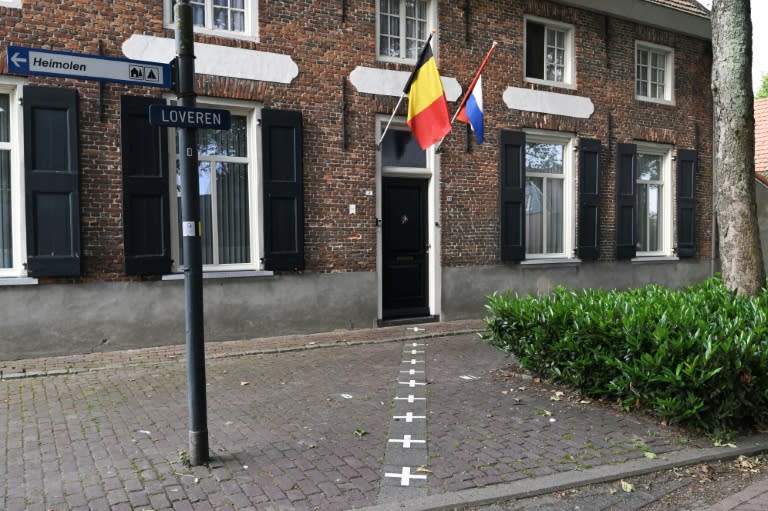'Europe in miniature': Welcome to Baarle, world's strangest border

If ever a place encapsulated the glorious complexity and sometimes paradoxical nature of the European Union, it would be Baarle, just on the Dutch side of the Netherlands-Belgium border.
The town of just under 10,000 people is split in two, Baarle-Nassau (which is Dutch) and Baarle-Hertog (a Belgian enclave surrounded by the Netherlands).
The international border runs through the town, marked by a series of white crosses in the pavement that sometimes even bisects buildings -- including the town hall.
And come European election day, the Dutch parts of the town voted on June 6 whereas their Belgian neighbours have to wait three days later to cast their ballot.
"Anyone Dutch? Come and vote in here," cried a volunteer outside the "Stembureau" (polling station) when AFP visited on Dutch election day.
Literally a few metres across the road is Belgium, a snack bar offering "Fresh Belgian Fries".
Dutch and Belgian election posters stand a stone's throw apart with a completely different set of candidates and parties.
The town's split identity is much more complex than a single border line. There are several separate chunks of land scattered around the town belonging to one country or the other.
There are 22 Belgian enclaves in total, the smallest the size of half a football pitch, and six Dutch "counter-enclaves" within these Belgian enclaves.
This means the border snakes haphazardly around the town, resulting in a bizarre patchwork quilt effect on international maps.
Visiting every enclave would mean crossing the Dutch-Belgian border 60 times in a few kilometres (miles), explained Ad Tuijtelaars from the local tourist office.
- 'World's strangest border' -
Anecdotes abound about the pecularities of the town, which describes itself as "Europe in Miniature" or the "World's Strangest Border Situation."
Couples tying the knot in the town hall have to decide which country to get married in. Left side of the room: Belgium. Right side: Netherlands.
In one house split by the border, a 90-year-old woman lives on the Belgian side. Her son just down the corridor ... in the Netherlands.
People seize upon different laws and tax regimes, said Tuijtelaars, a 75-year-old retired Dutch businessman.
"Petrol is cheaper in Belgium. Cigarettes are cheaper in Belgium. But food tends to be cheaper in the Netherlands," he told AFP.
In the Netherlands, fireworks can only be purchased in the run-up to New Year, but all year round in Belgium, meaning people flock to Baarle-Hertog to stock up on bangers.
Different national closing times once meant diners at a restaurant split by the border had to move across to the other side of the room to finish their meals.
The border runs through one of the supermarkets with a sign promising Belgian mayonnaise 25 metres to the left, Hagelslag (Dutch chocolate sprinkles) 30 metres to the right.
Covid sparked pandemonium -- in Baarle-Hertog, masks were compulsory but in Baarle-Nassau, only on public transport.
Tuijtelaars, born and bred in Baarle, recalls walking to school -- crossing through Belgium several times along the way.
"It was just normal for us as kids. It was only when I grew up and travelled abroad that I realised it was quite a unique situation," he said.
- 'No need for conflict' -
The geographical oddity, which attracts thousands of tourists every year from all over the world, has its roots in the Middle Ages.
The territory was first carved up in 1198 when Henry I, Duke of Brabant, handed some of his land to Godfried of Schoten, Lord of Breda.
The border question came to the fore in 1830 when Belgium became independent from the Netherlands and the issue was only finally settled in 1995.
Voting in the "Cafe in Holland", a pub-cum-polling station on the outskirts of the town, Theo van der Veerdonk, a 64-year-old lecturer, said Baarle offered lessons for Europe to come together.
"We have a town here of two nationalities and I think Europe should be one. You see in a town such as this that Europe actually isn't one at all. I think that's a pity," he told AFP.
"I want more Europe and more integration, to make Europe closer and better... Here we've got two town halls, two police services, two fire services... and that's completely crazy."
But Tuijtelaars said Baarle showed how neighbours can live together in harmony despite nationality and borders.
"If you live so close to each other, why should you quarrel? There's no need for conflict -- well, apart from when Belgium plays the Netherlands at football," he joked.
ric-jhe/ach

 Yahoo News
Yahoo News 
